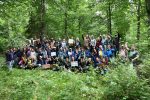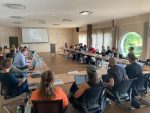by Steffi Ober, NABU
Growth and securing prosperity are the dominant priorities for research policy in the field of bioeconomy. However, a problem-oriented research strategy with an openness towards technologies, is essential to enable institutional, cultural and social innovations.
Foto: © Eva-Maria Lopez
Major challenges require courageous political action and a future-oriented science and research agenda: a roadmap off the beaten track, that advances social transformation with new, transdisciplinary alliances. Yet, sustainable development is complex, many decisions regarding a desirable future depend on social norms, on our values. Though, our ideas of prosperity and the good life depend as much on the current Zeitgeist and discourse as the the oft-cited common good. While some regard a return to the consumption level of the 1970s equal to a relapse to the Dark Ages, expecting a nightmare of renunciation, for others, establishing sufficiency is a necessary corrective of Western lifestyles safeguarding a sustainable future.
In research policy, however, clearly set principles are considered unquestionable: Growth and securing prosperity belong together just as much as ensuring the long-term viability of business sites and the competitiveness on the world market. The Federal Ministry of Education and Research (BMBF) is starting out on those premises and reproduces them through the selection of its experts: it acts as a gatekeeper and determines who belongs to the inner circle of expertise, who is heard in and outside the committees. Participation, on the other hand, is provided very selectively and suggestions are rarely taken up.
A sufficiency-oriented bioeconomy, or any proposal that would have a real impact on the 1.5-degree target are blind spots remaining unheard and unseen, since nobody represents positions off the course of the forementioned principles in the committees. The bioeconomy strategy is part of the high-tech strategy. A problem-oriented and technology-open research strategy, on the other hand, would entail as well low- or middle-tech, institutional, cultural and social innovations as possible solutions. In addition, it would involve the relevant experts with practical knowledge of transformation, who would be able to transfer this knowledge into society.
The bioeconomy strategy precisely reflects the political power relations. The invariable focus on efficiency and fixation on technologies obscures the need to enter into a social negotiation process. Here, scientific knowledge has the role of providing an informed background and enabling technological developments to implement concepts pointing to the future.
However, sustainable development requires cultural, economic and institutional changes which will not occur without resistance and conflict. So far, the bioeconomy strategy has failed to provide answers on how to deal with foreseeable conflicts. Instead, research policy relies on the narrative that massive investments in technologies and intensive land use concepts will enable a transformation without sacrifices. The key technologies for transformation are digitalisation and biotechnology. The goal is to maximise efficiency and people need to adapt to that. In an essence, the success of the transformation depends on activating sufficient capital, rapidly establishing the technologies on the market, creating innovation-friendly framework conditions and securing acceptance by means of social research.
Alternatives and a critical reflection enabled through participatory technology assessments are lacking. Such an assessment offers a reflexive framework in regards to the question how certain technological developments will be embedded in a sustainable development of a society. It is indispensable when it comes to designing possible futures, describing alternative paths, and analysing their conditions and consequences. Since the designs of the future will become normative plans with far-reaching ethical, legal, social and ecological consequences, the “societal dialogue” should be embedded in this process.
A bioeconomy research policy relevant to society would therefore have to fulfil three conditions:
1. Problem orientation and openness to alternative economic, ecological and institutional innovations.
2. Clear criteria for the appointment of expert panels including the Bioeconomy Council III as well as support for civil society organisations enabling their participation on an equal footing.
3. New spaces and nodes connecting civil society and science in order to build society as a resource and driver of the transformation. Established bodies between science and industry such as the Arbeitsgemeinschaft Industrielle Gemeinschaftsforschung (AIF) or the Akademie für Technikentwicklung (Acatech) demonstrate how it works.
Dr. Steffi Ober is an advisor for sustainable research and innovation at NABU as well as initiator and head of the civil society platform Forschungswende.







